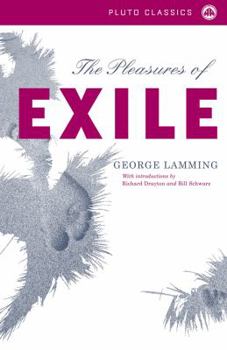The Pleasures of Exile (Pluto Classics)
Select Format
Select Condition 
Book Overview
'Migration in the 50s and 60s was formative for a whole generation of Caribbean writers, artists and intellectuals who, as Lamming himself says, became 'West Indian' in London. The Pleasures of Exile is simply the most poignant, eloquent, insightful and poetic set of reflections on that experience.'Stuart Hall'The passing of more than 40 years hasn't dulled the sheer brazen confidence with which George Lamming brought a West Indian way of seeing to British life and literature.'Peter Hulme'George Lamming is one of the most important writers in the African diaspora, and one whose work has touched illuminatingly on significant aspects of colonialism, postcolonialism, and other matters vitally important to our comprehension of the worlds in which we live.' Michael AwkwardGeorge Lamming is one of the major figures in late twentieth century literature: his novels -- including In the Castle of My Skin (1953) -- were part of the social, cultural, and political revolution of modern Black writing.The Pleasures of Exile, originally published in 1960, is Lamming's first work of non-fiction. Written during his self-imposed exile in Britain, it explores themes of identity formation. Incorporating memoirs of his own experience, Lamming draws upon Shakespeare's The Tempest and CLR James's The Black Jacobins, as well as his own fiction and poetry. He conjures a rich spectrum of physical, intellectual, psychological and cultural responses to colonialism.This new edition, with a new preface and introduction, reveals a writer far ahead of his time: written before the term 'post-colonial' was invented, the book explores issues that are central to studies of literature today, including the politics of migration, cultural hybridity and minority discourse.
Format:Paperback
Language:English
ISBN:0745323448
ISBN13:9780745323442
Release Date:September 2005
Publisher:Pluto Press (UK)
Length:256 Pages
Weight:0.55 lbs.
Dimensions:0.5" x 5.1" x 7.8"
Customer Reviews
1 rating
Still applicable to contemporary notions of immigration and exile
Published by Thriftbooks.com User , 16 years ago
Although published in 1960, this collection of essays still carries vast currency. This is a fantastic example of "historical revisionism" in that Prospero and Caliban have their relationship subverted and reformulated. As a descendant of slaves and the product of Western culture (he convincingly makes the case that all of us are either the latter or both), George Lamming realizes that we can't reject our past, but only grow from realizing what it means to us. Out of this tradition we can forge towards a hopeful future, neither forgetting nor refusing to let go of history. We have a responsibility to act for a better future, and Lamming articulates this in myriad splendid ways, through what he says is "one man's experience."





